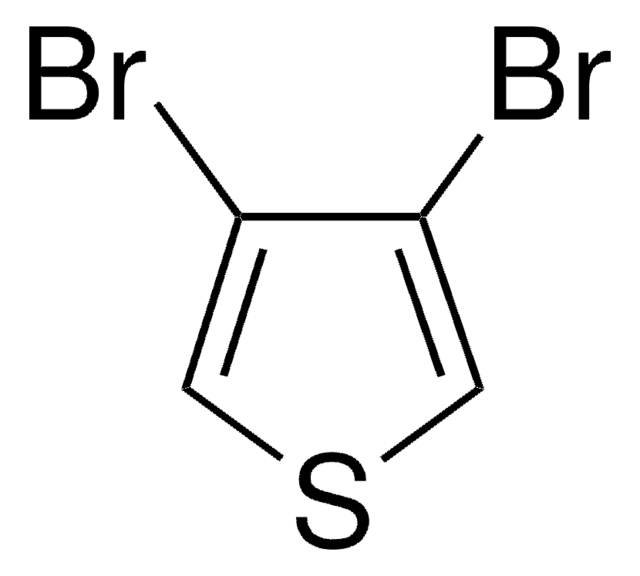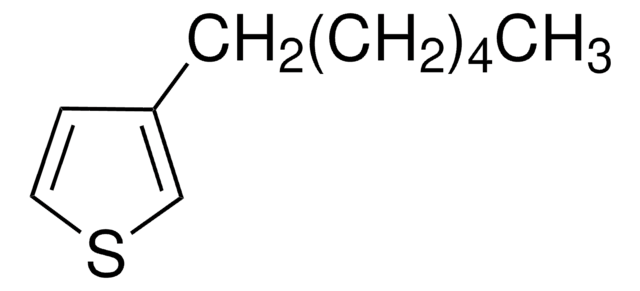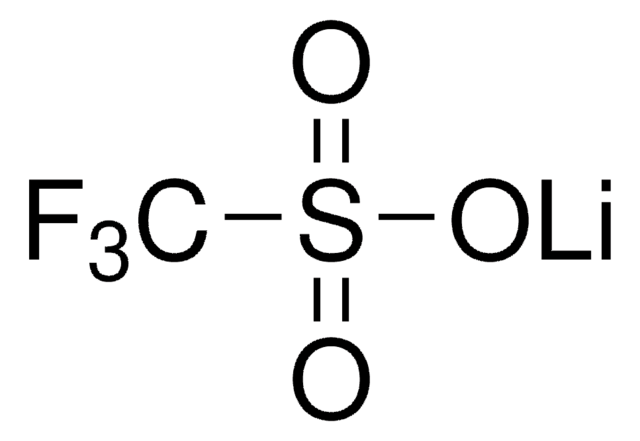660485
3,4-Propylenedioxythiophene
97%
Sinónimos:
3,4-Dihydro-2H-thieno[3,4-b][1,4]dioxepin, ProDOT
Iniciar sesiónpara Ver la Fijación de precios por contrato y de la organización
About This Item
Fórmula empírica (notación de Hill):
C7H8O2S
Número de CAS:
Peso molecular:
156.20
MDL number:
UNSPSC Code:
12352103
PubChem Substance ID:
NACRES:
NA.23
assay
97%
form
solid
mp
79-83 °C
SMILES string
C1COc2cscc2OC1
InChI
1S/C7H8O2S/c1-2-8-6-4-10-5-7(6)9-3-1/h4-5H,1-3H2
InChI key
WNOOCRQGKGWSJE-UHFFFAOYSA-N
General description
3,4-Propylenedioxythiophene (PRODOT) is a conductive polymer that forms a π-conjugated system. It has good electrochromic properties with high conductivity and surface electroactivity. It forms a thin film by using layer by layer (LBL) technique and spin coating.
Application
PRODOT can be used as a conjugated polymer in the fabrication of dye sensitized solar cells (DSSCs), sensors and electrochromic materials.
Storage Class
11 - Combustible Solids
wgk_germany
WGK 3
flash_point_f
Not applicable
flash_point_c
Not applicable
ppe
Eyeshields, Gloves, type N95 (US)
Certificados de análisis (COA)
Busque Certificados de análisis (COA) introduciendo el número de lote del producto. Los números de lote se encuentran en la etiqueta del producto después de las palabras «Lot» o «Batch»
¿Ya tiene este producto?
Encuentre la documentación para los productos que ha comprado recientemente en la Biblioteca de documentos.
Los clientes también vieron
Site-isolated electro-optic chromophores based on substituted 2, 2?-Bis (3, 4-propylenedioxythiophene) pi-conjugated bridges
Hammond SR, et al.
Chemistry of Materials, 20(10), 3425-3434 (2008)
Rational design of an electrochromic polymer with high contrast in the visible region: dibenzyl substituted poly (3, 4-propylenedioxythiophene).
Krishnamoorthy K, et al.
Journal of Materials Chemistry, 11(12), 2909-2911 (2001)
A high-performance counter electrode based on poly (3, 4-alkylenedioxythiophene) for dye-sensitized solar cells
Lee K, et al.
Journal of Power Sources, 188(1), 313-318 (2009)
Triphenylamine-based dyes bearing functionalized 3, 4-propylenedioxythiophene linkers with enhanced performance for dye-sensitized solar cells
Liang Y, et al.
Organic Letters, 12(6), 1204-1207 (2010)
Jae Joon Kim et al.
Science advances, 5(3), eaaw0463-eaaw0463 (2019-03-23)
We vapor print conformal conjugated polymer electrodes directly onto living plants and use these electrodes to probe the health of actively growing specimens using bioimpedance spectroscopy. Vapor-printed polymer electrodes, unlike their adhesive thin-film counterparts, do not delaminate from microtextured living
Nuestro equipo de científicos tiene experiencia en todas las áreas de investigación: Ciencias de la vida, Ciencia de los materiales, Síntesis química, Cromatografía, Analítica y muchas otras.
Póngase en contacto con el Servicio técnico

